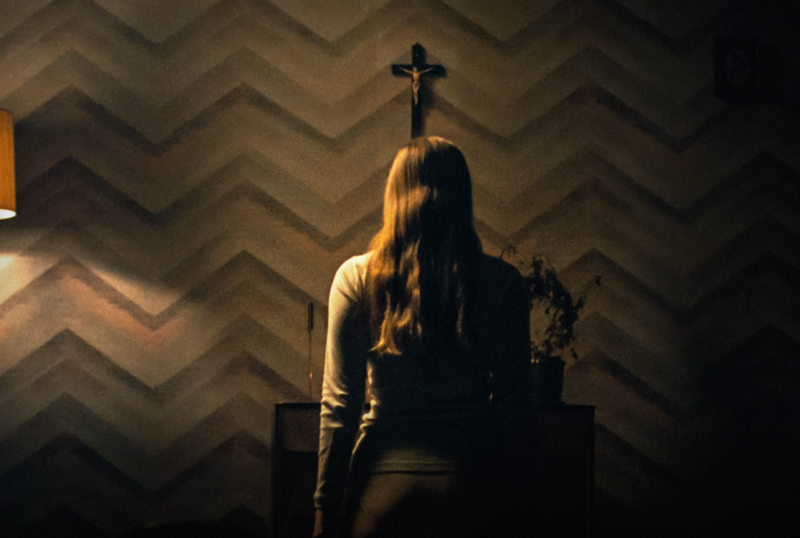
“You must be the loneliest girl I’ve ever seen.”
Sometimes, the cure can be worse than the disease. That figure of speech meant to warn about solutions that result in a fate worse than what you sought to rectify, particularly due to unforeseen circumstances, has come to be widely known yet remains potently foreboding. In a world where many people seem to be searching for meaning and purpose, millions have seemingly sought refuge in huge philosophical movements or identity groupings in order to find the solace they’re looking for. But as we have seen in highly publicized moments, becoming devoted to a cause or religion can end up pulling people into deeper, darker holes than the ones whence they came. What is it about joining a group or adopting an organized mindset that can be so dangerous, particularly for those already suffering? Saint Maud tells a tale of the dangers of what on the surface may seemingly be therapeutic and good.
The film’s namesake Maud (Morfydd Clark) is a reclusive young nurse whose impressionable demeanor causes her to pursue a pious path of Christian devotion after experiencing a traumatic work accident. Now charged with the hospice care of Amanda (Jennifer Ehle), a retired dancer ravaged by cancer, Maud’s fervent faith quickly inspires an obsessive conviction that she must save her ward’s soul from eternal damnation, whatever the cost.
The film is intimately shot, mirroring its intimate tone and subject matter. The audience is taken up close and personal with the characters, bringing us into their world to compliment our journey into their psyche as well, particularly Maud. An example of director Rose Glass’ quality visual style in the film is a superb shot of Maud stumbling down a corridor after a night out at the bar and subsequent one night stand. The walls of the stairwell are narrow and close in around her with the camera tilted at an angle, an apt visual metaphor for the walls that are closing around her and her life as it spirals out of control. Indeed, the recurrence of spirals appearing throughout Saint Maud is just one bit of visual storytelling employed by Glass. The director often dresses the subjects of Maud’s moral ire and indignity in red, specifically a red and white nightgown that is worn at separate points by both Amanda and her female lover.
Saint Maud’s exploration of devotion and obsession is a fairly interesting one. What is the difference between the two? What exactly makes one admirable and the other unhealthy? What is the resulting effect on a person’s perception of reality once they cross this line? We see this theme explored both on a microlevel in regards to Maud’s individual religiosity and relationship with Amanda, and in the larger sense of its exploration of religion in general. Human beings often embrace religion to find meaning, particularly after having tough or traumatic experiences, or to feel a sense of belonging. As we gradually learn more about Maud, both seem to be in play for her as motivations. Adhering to religious dogma gives Maud a sense of belonging and a way to cope with previous bad experiences. Being dogmatically devoted to a belief set however can often exacerbate problems rather than heal them. Maud’s devotion to serving what she thinks are God’s desires loosens her grip on reality and perception of those around her. Maud is a profoundly lonely girl, dwelling on tragedy and a sense of misplacement, and seeking religion to find meaning. Instead, she slips deeper into her isolation and mental health problems as a result of her dogmatic views.
There is a lesson here that can be applied to our world as it stands currently, with the rise of movements that command loyalty and devotion in the face of any evidence to the contrary. As Maud spiraled down the rabbit hole further as her belief set so obviously destroyed her life, we can examine how misusing any organized movement to fill that which is missing within us can make worse whatever problems we are seeking to fix. The film can be a bit muted and deliberate in making this point, but it’s well executed from a technical and writing standpoint even if its entertainment value may not be as engaging for many in the audience. Rose Glass is impressive not just with her visual flair, but also in her execution of Saint Maud’s narrative, however subtle it may be. The chemistry between Morfydd Clark and Jennifer Ehle works well with both actresses offering quality performances. Saint Maud is an interesting watch that keeps you engaged but doesn’t blow you away.
Image: A24

